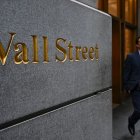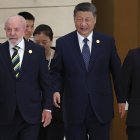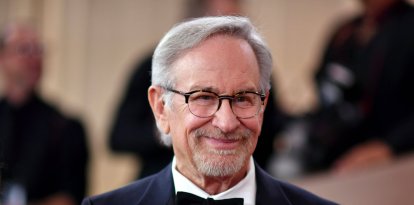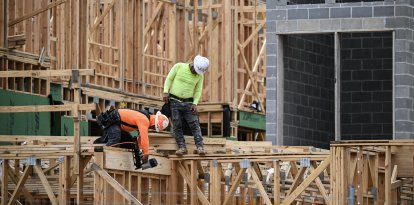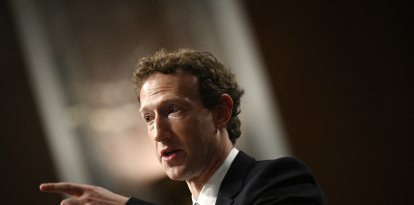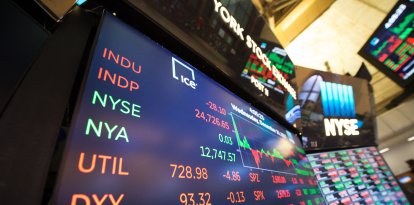ANALYSIS.
The start of the tariff 'cease-fire' between the US and China gives oxygen to the markets
After Wall Street's bullish rally on Tuesday, most Asian markets closed in the green, while European trading floors start with doubts amid fears that Trump will now escalate tensions with the EU.

A woman smiles as she walks past an indicator screen at the Hong Kong Stock Exchange.
The entry into force of the tariff cease-fire gave a fresh boost to the world's major stock markets, though more modestly, as investors had already priced in its effects following the announcement of the deal last Monday. After the euphoria on Wall Street, the Chinese markets were the main beneficiaries in Asia, while European stock markets opened with mixed performances, amid concerns that Donald Trump will now escalate tensions with the EU.
The day before the trade truce between the world’s two largest economic powers came into effect brought good news on Wall Street, with the S&P closing in the green for the first time in 2025 and recovering—along with the Nasdaq—the losses accumulated so far this year. U.S. indexes were also boosted by better-than-expected CPI data and a trade deal with Saudi Arabia.
Asian markets greeted the entry into force of the agreement with gains across the board, especially the Chinese trading floors, while the Japanese Nikkei closed with slight losses (-0.14%). The FTSE A50 was the index with the highest gains (1.71%), followed by the Shanghai Composite, which experienced a growth of almost one point (0.86%). Curiously, the Saudi stock market also closed in the red despite the agreement with the US.
Trump boasts of having a "very, very solid" agreement ready with Beijing
In an interview on Air Force One with Sean Hannity, Trump stressed that Washington's draft to close a "very solid" trade deal with China will allow for "the opening up" of the Asian economy to U.S. companies: "We have the framework of a very, very solid deal with China. But the most exciting part of the agreement is the opening of China to business with the United States."
For his part, the president of the Chinese Communist Regime, Xi Jinping pointed out, during his meeting with Latin American leaders in Beijing that "there are no winners in a tariff war or a trade war." Along with him, the top Chinese diplomat, Wang Yi, encouraged the countries of that region to "act hand in hand" with them in the face of tariffs and lashed out against "a certain world power" that is "obsessed" with the law of the strongest.





